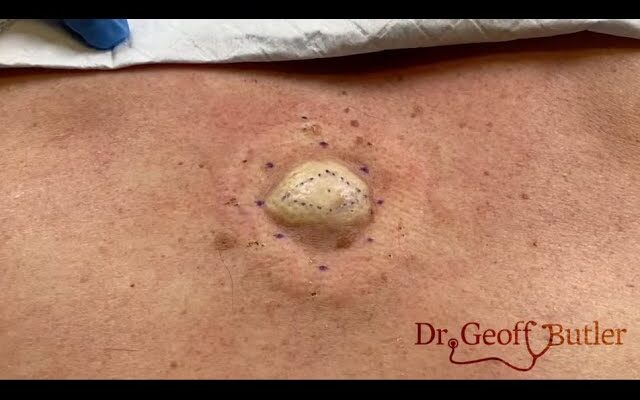The removal of an epidermal cyst (also known as an epidermoid cyst) on the back is a fairly common procedure. Epidermal cysts are non-cancerous, closed sacs filled with keratin, a protein found in skin cells. If you’re considering or have been advised to remove an epidermal cyst, here’s a general overview of what the process typically involves:
Steps for Removal:
- Consultation: A healthcare provider, usually a dermatologist or a surgeon, will first assess the cyst. They may check its size, location, and whether it has become infected or painful. In some cases, they might recommend leaving it if it’s small and not causing any issues.
- Local Anesthesia: Before removing the cyst, the area around it will be numbed with a local anesthetic. This will ensure that you don’t feel pain during the procedure.
- Incision: The doctor will make a small incision in the skin over the cyst. If the cyst is large or deeply embedded, they might need to make a slightly larger incision.
- Cyst Removal: The doctor will carefully remove the cyst, including its contents and the sac (which can prevent it from returning). In some cases, if only the contents are removed, the cyst may recur.
- Stitching: If necessary, the incision is stitched closed with dissolvable or non-dissolvable stitches. A dressing will be applied to keep the wound clean.
- Aftercare: You’ll be given instructions for taking care of the wound after the procedure. This usually includes keeping the area clean, avoiding strenuous activities for a few days, and possibly using antibiotic ointment to prevent infection.
- Follow-up: If stitches were used, a follow-up appointment might be scheduled to check on the healing process and remove stitches if needed.
Risks:
- Infection
- Scarring
- Recurrence of the cyst (if the sac isn’t fully removed)
Most people heal fairly quickly, but the exact recovery time can vary based on the size and location of the cyst, as well as the method of removal.
If you are considering having a cyst removed, or if you’ve been advised to, make sure to discuss the specifics with your healthcare provider to understand what’s best for your situation.



